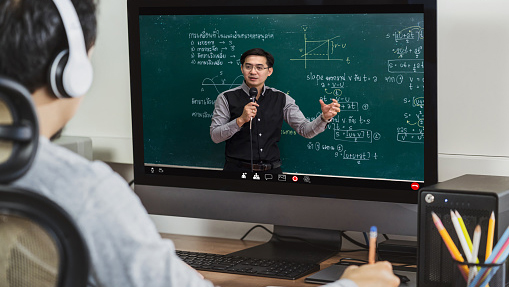Online college has its perks and its drawbacks; time to learn what’s what and see if it’s right for you.

The pandemic has changed a lot. From closures of restaurants and stores to new safety and public health measures, the United States and the world look different now than they did in March 2020. And something else has changed too. Every, or almost every, college and school shifted online. Vaccination rates are rising, but online schools, both before and after the pandemic, are here to stay and may be worth it. But it all depends on your needs as a student.
In the olden days of the internet, which were what, like ten years ago or something(?), there was a kind of wild west vibe to online school. It was hard to tell who was accredited and who wasn’t. Employers may have looked with scrutiny at an online degree in a way they wouldn’t have with an in-person college. It was all sort of William Gibson Neuromancer-esque, but a whole lot more boring (and I really do mean a whole lot).
But now, things have changed. Online colleges, especially the right ones, are great, accredited options that give you the confidence to go into the workforce. And the pandemic has shifted the status quo even further: when all college (and business) is online, employers have to realize the same kinds of learning can be accomplished from your computer screen. That doesn’t mean there aren't some drawbacks; we have to consider both the good and the bad - and I can guarantee you we won’t wind up with anything ugly.

Flexibility
This is the magic word; the modern day ‘open sesame’; the equivalent to “Speak ‘friend’ and enter.” Except there will be no Mines of Moria when you utter this passphrase, no giant squid (technically a ‘watcher in the water’ *pushes up glasses*) to come after you (also it’s not Elvish). Flexibility is one of the greatest perks of online education. It speaks for itself. But I’ll also allow Dr. Vince Rodriguez, Coastline College’s Dean of Instruction, speak for it too.
“In a pandemic, if I’m going to be taking classes online I want to know it’s from a college with experience in distance learning,” Dr. Rodriguez pointed out to me. The flexibility of online college allows working professionals—musicians, actors, people in any field really—to still go to college and secure a higher learning degree.
Explore Online Learning @ Coastline
The Different Kinds of Flexible...
Dr. Rodriguez also made clear that there are different kinds, almost tiers, of online learning. There is ‘in-person’ online. Think Zoom lectures and discussions with a living, breathing professor and classmates. However, there’s also the asynchronous approach: assignments and workbooks to do during the week along with pre-recorded presentations or modules to learn from. Then, a typically once-a-week check-in, either live or by email, to make sure everyone is at speed with the course material.
Let’s say you already work and are juggling a kid at home. Or, you just graduated from high school, work part or full-time, and can’t stand the idea of spending all day in another classroom (the way you have been for your whole academic life). The asynchronous learning model is exactly what you’re looking for. It gives you the chance to do your learning on your own time, your own schedule, so long as it’s done before it’s due. Amy Severns, Coastline student, says "It's basically guided independent study" and "I can go to school on my own time throughout the week."
The experience is different from Zoom because it allows you to essentially be in two places at once. You're technically always in school and out of school at the same time: when you drop your kids off at school and you take a quick break to learn some new material; when you're at work and on your lunch hour; when you take care of assignments while binge-watching The Great British Baking Show!
There is another thing to consider, however: the difference between a cobbled Zoom class thrown together during the pandemic and the cohesive, well-designed, structured courses offered by experienced online colleges. Think of it like the difference between a Formula 1 racer and your neighbor's thrashed minivan. One (the experienced online college) is efficient and peak-performing, primed for success, and the other, while well-intentioned, wasn't designed for optimum usage by students and faculty. More often, these experienced schools will utilize the asynchronous model because it allows greater flexibility. Both approaches work, but the asynchronous one may be ideal. The modules are all online and easy to use. It truly is learning made easy. Noah Nelson, another Coastline student, appreciates that he can "get done with work sooner." When you find your online college, make sure to find out what courses they offer and how they are taught.

Less Social Interaction
This is one of the cons of an online college. By necessity, there is less, if any, face-to-face interaction. If you live near the campus of your online college (if they have a physical campus) then you could make visits or join an in-person club, but otherwise, in-person face-to-face meeting options will be few and far between.
It’s worth pointing out how the pandemic has already disrupted in-person classrooms anyway. If you have found during the pandemic that you didn’t miss the social interaction - that perhaps you got your daily dose of Vitamin P(eople) from other sources (like roommates, friends, or family) - then online college is an excellent way to learn for you.
Check out Student Clubs @ Coastline
If social interaction is important to you (even for simple networking opportunities) you can also join your college’s virtual clubs. These virtual clubs, while not as lively as in-person ones, are still great ways to meet people and connect.

Affordability
In general, online college is cheaper, and more affordable, than brick and mortar. This is true for a variety of reasons. Exclusively, or mostly, online colleges have fewer operating costs (real estate is expensive!) and thus less support and maintenance staff (think more I.T. and fewer groundskeepers). That lower cost is passed onto the student. But it’s also more affordable in other ways. The student doesn’t have to find new, potentially more expensive housing closer to campus; finally, there’s no commute, which saves both time and expense.

Limitations in Learning
What I mean by this is that you can’t become an aerospace engineer (for example) solely through online learning. At some point, you have to step onto a campus in order to finish your degree. All of which is to say there are some degrees that necessitate in-person learning still, like medical school.
These are generally the highest of educations (think doctorates) and are very technical in nature. There may be limitations to the programs offered by an online school, more limitations than in-person. However, this is changing all the time and the pandemic forced a lot of colleges to rapidly figure out how to teach a host of programs solely online. So this isn’t so much a con as it is a forewarning.

Wrappin' It Up
In summary: flexibility and affordability are two pros to online college and less social interaction and learning limitations are two cons. Neither outweighs the other; it all depends on your circumstances and context. The bottom line is this: fundamentally, online learning is better when you’re just starting your education journey. The more advanced your courses need to be, the higher the odds you won’t be able to take them online. So, it makes more sense to start online; you can always move into in-person school later, but if you advance to a higher degree (M.D., PhD, etc.) it may be tougher to find an online solution (though they do exist).